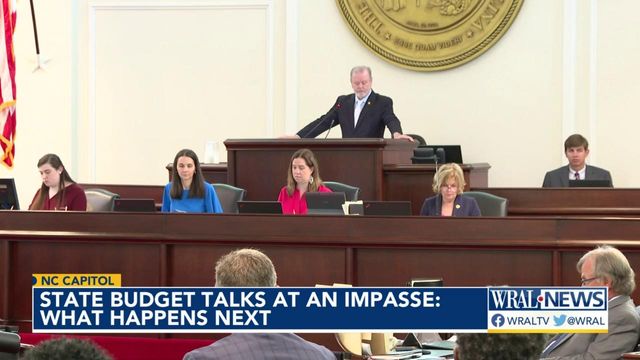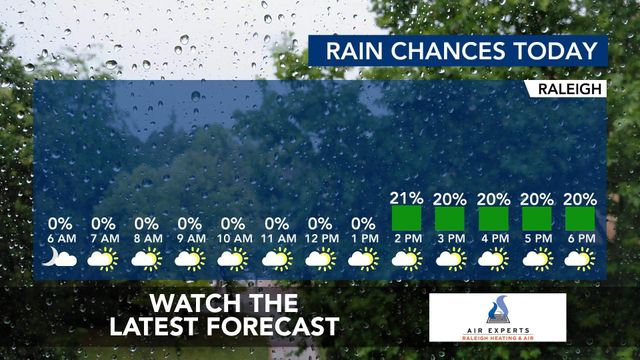Cooler tempers as budget negotiations resume, but no end in sight for casino, spending deal
The General Assembly’s top Republican lawmakers met throughout the day Wednesday to negotiate a state budget plan derailed over a controversial plan to expand legalized gambling.
No one expected those negotiations to yield a final budget before day’s end, but tempers were cooler after asharp back-and-forth Tuesday between leadership for the House and Senate’s Republican majorities, which had added heat to already intense and lengthy deliberations over the annual $30 billion spending plan.
“Yesterday was kind of a pressure-cooker around this place,” Speaker of the House Tim Moore said.
Moore, R-Cleveland, and Senate Republican Leader Phil Berger had planned to meet several times Wednesday. Moore said the immediate plan was to “lower the temperature” and have “a full, candid discussion about what the various options are right now.”
Moore also backed off a plan, hinted at Tuesday, to strip out of the budget the gambling language Berger is pushing for and vote that through the House. Such a scenario would leave it to Berger’s Senate to decide whether a budget that contains raises for teachers and state employees, as well as a major Medicaid health insurance expansion, is further delayed.
“It's certainly an option to do that,” Moore said Wednesday morning. “But we want to explore and see where we can be as far as getting a budget before going down that road.”
Berger, R-Rockingham, told reporters he continued to believe Moore should bring the budget up for a vote as-is — meaning with authorizations for four new casinos and legalizing video gambling terminals in gas stations and restaurants around the state.
Moore has said repeatedly over the past week that he doesn’t have the votes to pass the plan in his chamber. Berger suggested that Moore should call gambling opponents' bluff, given the wide range of priorities meshed together in the plan. That includes Medicaid expansion, a massive Democratic goal for more than a decade, and a tax cut and private school voucher expansion favored by Republicans.
“It’s very easy to say, ‘I don't want [gambling] in there’ in either a one-on-one conversation or, particularly, in a group meeting of some sort,” Berger said. “I think that the votes would be there if it were put on the floor.”
Berger also reiterated the he wanted Moore to adhere to past practice for the House’s Republican majority of bringing bills up for a vote if at least half the chamber’s Republican majority supports them. The budget-and-gambling deal has cleared that threshold. But without enough House Democrats willing to vote for the plan as well, Moore has said the plan doesn’t have the 61 votes it needs to pass the 120 member House.
“No speaker is going to put a bill on the floor that he does not think there are the votes for,” Moore told WRAL News Tuesday.
House Democratic Leader Robert Reives has indicated that few Democrats are willing to back the plan, largely because the Republican majority hasn’t let them see it. Democratic Gov. Roy Cooper said he hasn’t seen it either, so he couldn’t rule out a veto of the budget.
That would up the threshold for final passage to 72 votes in the House — meaning every member of the chamber’s Republican supermajority would have to vote 'yes' unless Democrats back the Republican plan.
The public hasn’t seen the budget either. Republican lawmakers haven’t released the gambling language expected to legalize and tax video poker machines, which the state has tried to stamp out for decades. Nor have they released figures for teacher raises, employee raises or planned tax cuts.
Moore confirmed Wednesday, though, that whatever raises the budget includes, they’ll be retroactive to July 1, so workers won’t miss out on money.
The casino language is partly secret, too, though lawmakers and a draft version leaked to WRAL News in June have confirmed some details. That draft called for three new commercial casinos, including one in Berger’s home county of Rockingham, and a fourth casino run by the Lumbee tribe in southeastern North Carolina.
The three non-tribal casinos would each require a $500 million investment from the operating company, which would build an entertainment district around their casino with hotels, restaurants and other businesses. These would generate thousands of jobs, and supporters have billed the proposal as an economic shot in the arm for rural areas.
Cordish Cos., a national casino developer, has pursued land deals in at least two counties: Rockingham and Nash. The company has also hired lobbyists this legislative session with ties to Berger and to Cooper’s administration, and company executives began making campaign donations to North Carolina lawmakers in 2022.
The state’s new fiscal year started July 1, making the state budget more than two months overdue. Lawmakers once thought they’d have the budget done by June and end the legislative session, but the spending plan was kicked steadily down the road over a number of disagreements between House and Senate Republicans.
Now, Moore says, the gambling issue is all that remains.
There's no fear of a government shutdown because of a state law dictating that, until a new budget is in place, state government operates under the old budget. But the failure to reach agreement on gambling is delaying Medicaid expansion, which Republicans embraced earlier this year after opposing it for more than a decade. The expansion deal was tied to the budget, though, so the hundreds of thousands of people who would qualify for health insurance can’t be enrolled until after a budget passes.
Moore and Berger have both rejected calls from Cooper and other Democrats to decouple expansion from the budget so those who qualify can get needed health care. Tying Medicaid to the budget gives the Republican majority leverage over Democrats who will feel pressure to vote for items in the budget they don’t support to implement expansion.













